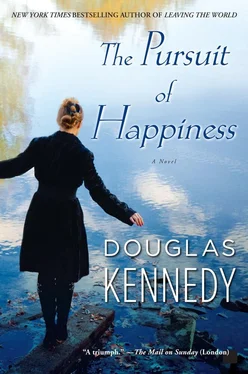When they finished their first set, Eric turned to me and said, 'S, you're going to eventually brag about being at this gig. Because we have just witnessed ourselves a true revolution. After tonight, rhythm is never going to be the same again'.
S. That was his name for me. S for Sara or Sis. From the time Eric turned fourteen, he called me that - and though my parents both hated the nickname, I cherished it. Because my big brother had bestowed it on me. And because, in my eyes, my big brother was the most interesting and original man on the planet... not to mention my protector and defender, especially when it came to our deeply traditional parents.
We were born and raised in Hartford, Connecticut. As Eric was fond of pointing out, only two interesting people ever spent time in Hartford: Mark Twain (who lost a lot of money in a publishing house that went bust there), and Wallace Stevens, who coped with the tedium of being an insurance executive by writing some of the most experimental poetry imaginable.
'Outside of Twain and Stevens', Eric told me when I was twelve, 'nobody of note ever lived in this city. Until we came along'.
Oh, he was so wonderfully arrogant. He'd say anything outrageous if it upset our father, Robert Biddeford Smythe III. He fit his portentous name perfectly. He was a very proper, very Episcopalian insurance executive; a man who always wore worsted three-piece suits, believed in the virtues of thrift, and abhorred flamboyance or mischief-making of any kind. Our mother, Ida, was cut from the same stern material: the daughter of a Boston Presbyterian minister, ruthlessly practical, a triumph of domestic efficiency. They were a formidable team, our parents. Cut-and-dried, no-nonsense, reluctantly tactile. Public displays of affection were rare events in the Smythe household. Because, at heart, Father and Mother were true New England Puritans, still rooted in the nineteenth century. They always seemed old to us. Old and forbidding. The antithesis of fun.
Of course we still loved them. Because, after all, they were our parents - and unless your parents were savage to you, you had to love them. It was part of the social contract - or at least it was when I was growing up. Just as you had to accept their manifold limitations. I've often thought that the only time you truly become an adult is when you finally forgive your parents for being just as flawed as everyone else... and then acknowledge that, within their own boundaries, they did the best they could for you.
But loving your parents is far different from embracing their world-view. From the time Eric was in his teens he worked hard at infuriating Father (yes, he insisted we address him in that Victorian manner. Never Dad. Or Pop. Or anything hinting at easy conviviality. Always Father). Sometimes I think Eric's radical politics were less rooted in ideological conviction, and more to do with raising Father's blood pressure. The fights they used to have were legendary. Especially after Father discovered the copy of John Reed's Ten Days that Shook the World under his son's bed. Or when Eric presented him with a Paul Robeson record on Father's Day.
My mother stayed out of all father/son arguments. To her, a woman had no business debating politics (one of the many reasons why she so hated Mrs Roosevelt, calling her 'a female Lenin'). She was always lecturing Eric about respecting Father. But, by the time he was ready to enter college, she realized that her stern words no longer carried any import; that she had lost him. Which saddened her greatly. And I sensed that she was always a bit baffled as to why her only son - whom she had raised so correctly - had turned into such a Jacobin. Especially as he was so astonishingly bright.
That was the only thing about Eric which pleased my parents - his exceptional intelligence. He devoured books. He was reading French by the age of fourteen, and had a working command of Italian by the time he entered Columbia. He could talk knowledgeably about such abstract, abtruse subjects as Cartesian philosophy or quantum mechanics. And he played a mean boogie-woogie piano. He was also one of those maddening whizkids who got straight As in school with minimal work. Harvard wanted him. Princeton wanted him. Brown wanted him. But he wanted Columbia. Because he wanted New York, and all its ancillary freedoms.
'I tell you, S, once I get to Manhattan, Hartford won't see me ever again'.
That wasn't exactly true - because, despite his rebelliousness, he still remained a reasonably dutiful son. He wrote home once a week, he made brief visits to Hartford at Thanksgiving and Christmas and Easter, he never shoved Mother and Father out of his life. He simply reinvented himself completely in New York. To begin with, he changed his name - from Theobold Ericson Smythe to plain old Eric Smythe. He got rid of all those Ivy League Rogers Peet clothes that my parents bought him, and started shopping at the local Army/Navy store. His skinny frame got skinnier. His black hair grew thick, bushy. He bought himself a pair of narrow rimless spectacles. He looked like Trotsky - especially as he took to wearing an Army greatcoat and a battered tweed jacket. On the rare times my parents saw him, they were horrified by his transformed appearance. But, once again, his grades silenced them. Straight As. Elected to Phi Beta Kappa at the end of his junior year. High honors in English. Had he wanted to go to law school, or get a doctorate, he could have waltzed into any graduate program in the country. But instead, he moved downtown to Sullivan Street, swept floors for Orson Welles for $20 a week, and dreamed big dreams about writing plays that mattered.
By 1945, those dreams were dying. No one would even look at his plays anymore - because they belonged to another era. But Eric was still determined to break through as a playwright... even if it meant writing hack jokes for Joe E. Brown to keep a roof over his head. Once or twice, I dropped hints about maybe finding a teaching job in a college - which struck me as more worthy of Eric's talents than churning out one-liners for a game show. But Eric refused to entertain such notions, saying things like, 'The moment a writer starts teaching his trade, he's finished. And the moment he enters academia, he slams the door on the real world... the place about which he's supposed to be writing'.
'But The Quiz Bang Show isn't the real world', I countered.
'It's more rooted in reality than teaching English composition to a bunch of prim little women at Bryn Mawr'.
'Ouch!' I said, having graduated from Bryn Mawr two years earlier.
'You know what I'm saying here, S'.
'Yes - that I am a prim little woman who probably should be married to some dreary banker, and living in some prim little town on the Philadelphia Main Line...'
Certainly that was the life my parents envisaged for me. But I was having none of it. After I graduated from Bryn Mawr in '43, Mother and Father hoped that I would marry my steady back then - a Haverford graduate named Horace Cowett. He'd just been accepted into U. Penn law school, and had proposed to me. But though Horace wasn't as prim and humorless as his name (he actually was a rather bookish fellow who wrote some halfway decent poetry for the Haverford literary magazine), I still wasn't ready to impound myself in marriage at a premature age - especially to a man I liked, but about whom I felt no overwhelming passion. Anyway, I wasn't going to squander my twenties by sequestering myself in dull old Philadelphia, as I had my sights set on the city ninety miles north of there. And nobody was going to stop me from going to New York.
Predictably, my parents tried to block my move there. When I announced - around three weeks before my graduation - that I had been offered a trainee job at Life, they were horrified. I was home for the weekend in Hartford (a trip I made deliberately to break the job news to them, and also to inform them that I wouldn't be accepting Horace's marriage proposal). Ten minutes into the conversation, the emotional temperature within our household quickly hit boiling point.
Читать дальше












